七年级英语形容词和副词
- 格式:doc
- 大小:92.50 KB
- 文档页数:47
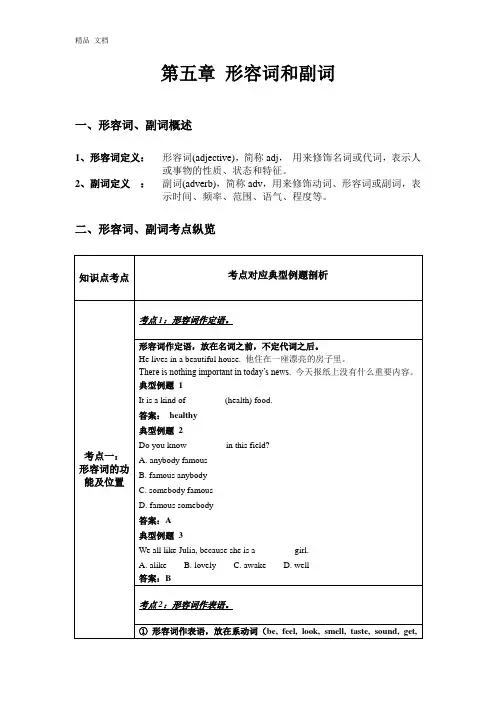
第五章形容词和副词一、形容词、副词概述1、形容词定义:形容词(adjective),简称adj,用来修饰名词或代词,表示人或事物的性质、状态和特征。
2、副词定义:副词(adverb),简称adv,用来修饰动词、形容词或副词,表示时间、频率、范围、语气、程度等。
二、形容词、副词考点纵览三、综合练习( )1. –If you don’t like the red coat, how about the green one?–OK, but do you have _______ size in green? This one is a bit small for me.A. a bigB. a biggerC. the bigD. the bigger( )2. –Mum, I think I’m _______ to get back to school.–Not really, my dear. You’d better stay at home for anoth er day or two.A. so wellB. so goodC. well enoughD. good enough ( )3. –What delicious cakes! –They will taste _______ with butter.A. goodB. betterC. badD. worse( )4. –Mr. Zhou , of all the students in our group, who lives _______ ?–I think Li Lei does.A. farB. fartherC. farthestD. the farther( )5. With a history of more than 1,400 years, ZhaoZhou Bridge is the _______ stone arch bridge in the world .A. oldB. olderC. oldestD. elder( )6. Bob never does him homework _______ Mary. He makes lots of mistakes.A. so careful asB. as carefully asC. carefully asD. as careful as ( )7. A: How can I speak English _______ you?B: You’d better speak more, I think.A. as good asB. more thanC. as well asD. as much as( )8. Your English is good. I’ll try my best to speak it as _______you do.A. clearly asB. clear asC. clearer thanD. more clearly ( )9. –Is your mother badly ill?–No, _______ , only a little cold.A. serious anythingB. serious nothingC. nothing seriousD. anything serious( )10. I’m not sure if I’m going to Tim’s party; I may go to the concert _______ .A. onlyB. insteadC. earlyD. late( )11. Although they are brothers, they are the _______ opposite of one another.A. veryB. justC. fewD. little( )12. The new Bright Restaurant is _______ than the old one. Moore and more people like to eat there.A. goodB. betterC. badD. worse( )13. Wang Ping does _______ in physics that I missed the first class.A. badlyB. Most badlyC. worseD. worst( )14. I got up so _______ this morning that I missed the first class.A. earlyB. lateC. quietlyD. neatly( )15. –Do you enjoy traveling by plane?–No. It’s _______ expensive.A. much moreB. more muchC. too muchD. much too( )16. I’m afraid the headmaster is _______ busy to meet the visitors.A. too muchB. much tooC. so muchD. much too( )17. How beautifully she sings! I’ve never heard _______ .A. the better voiceB. a good voiceC. the best voiceD. a better voice( )18. You do well in your lessons. I’m _______ you will pass the exam.A. sureB. afraidC. sadD. sorry( )19. –Who is _______ in your class?–Fred.A. tallB. tallerC. tallestD. the tallest( )20. –What do you think of the football match?–Wonderful! The Chinese football team has never played _______ .A. betterB. bestC. worseD. worst( )21. The population of China is _____ than _____ of any other country in the world.A. larger , the oneB. more , thatC. larger , thatD. more , the one ( )22. There is much wine here, but _______ people want to drink it.A. manyB. a littleC. fewD. a few( )23. People speak ______ of the film Not One Less. It is really necessary for every child to go to school.A. loudB. loudlyC. highD. highly( )24. She always finishes her homework on time. She ______ leaves it for tomorrow.A. alwaysB. neverC. usuallyD. sometimes( )25. The football match was _______, so the boys were _______ about it.A. excited , excitingB. exciting, excitedC. excited , excitedD. exciting , exciting( )26. Playing table tennis isn’t difficult. You can learn it _______.A. easyB. easilyC. quickD. hardly( )27. We Chinese always put our family name _______.A. lastB. nearlyC. firstD. in the middle ( )28. This kind of T-shirt look _______ and sells _______ in the market.A. nice, goodB. well , wellC. nice , wellD. good , nice( )29. The light in the room wasn’t _______ for me to read.A. brightly enoughB. enough brightlyC. enough brightD. bright enough( )30. –Look, this digital camera is really cheap! It’s only five hundred yuan.–The _______ , the better. I’m short _______ money, you know.A. cheaper , ofB. cheap, forC. expensive , ofD. more expensive , for( )31. Which subject do you like _______ , math, Chinese or English?A. betterB. bestC. wellD. very much( )32. _______ little water is not enough for _______ many people.A. Such , soB. So , soC. Such , suchD. So , such( )33. English is spoken by _______ people.A. a lotB. much manyC. a large number ofD. a great deal of ( )34. –Isn’t that Mary?–Yes, she always has a(an) _______ smile on her face.A. aloneB. kindlyC. ownD. friendly( )35. –Do you prefer music to drawing?–No. I like drawing _______.A. wellB. mostC. betterD. best( )36. Since China has been a member of the WTO, English is ______ useful than before.A. moreB. mostC. muchD. very( )37. Can you speak a little louder? I can _______ hear you.A. hardB. reallyC. hardlyD. clearly( )38. China has a _______ population and long history.A. manyB. largeC. muchD. big( )39. Do you have _______ to say?A. important anythingB. anything importantC. important somethingD. something important( )40. Which is _______ , English or Chinese?A. interestingB. interestingerC. more interestingD. most interesting( )41. –The TV programme is boring. Shall we play chess intead?–All right. That is _______ than watching a boring programme.A. very goodB. much goodC. very betterD. much better( )42. –Mum, could you buy me a dress like this?–Certainly, we can buy _______ one than this, but _______ this.A. a better, better thanB. a worse , as good asC. a cheaper , as good asD. a more important , not as good as ( )43. Let’s enjoy the song Yesterday Once More. It sounds _______.A. wellB. sadlyC. niceD. bad( )44. –Is the physics problem _______ ?–Yes. I can work it out _______.A. easy , easilyB. easy, easyC. easily , easyD. easily , easily ( )45. Hainan is a very large island. It’s the second _______ island in China.A. largeB. largerC. largerD. most large( )46. What a _______ cough! You seem _______ ill.A. terrible, terriblyB. terribly , terribleC. terrible , terribleD. terribly , terribly ( )47. I’m not sure whether Mary can sing _______ Mabel.A. as well asB. as good asC. so good asD. as better as( )48. Chinese is _______ more difficult than English.A. mostB. veryC. manyD. much( )49. The _______ old man told his son to be a good boy.A. diedB. deadC. dyingD. death( )50. Today my sister is feeling _______ to go to the factory.A. enough goodB. good enoughC. well enoughD. enough well参考答案精品文档1—5 B C B C C6—10 B C A C B11—15 A B D B D16—20 B D A D A21—25 C C D B B26—30 B C C D A31—35 B B C D C36—40 A C B B C文档说明(Word文档可以删除编辑)专注于精品文档:中考、高考、数学语文英语试卷、高中复习题目、小学试卷教案合同协议施工组织设计、期中、期末等测试,本文档目的是为了节省读者的工作时间,提高读者的工作效率,读者可以放心下载文档进行编辑使用.文档来源网络改编,审核有可能疏忽,如果有错误或侵权,请联系本店马上删除。

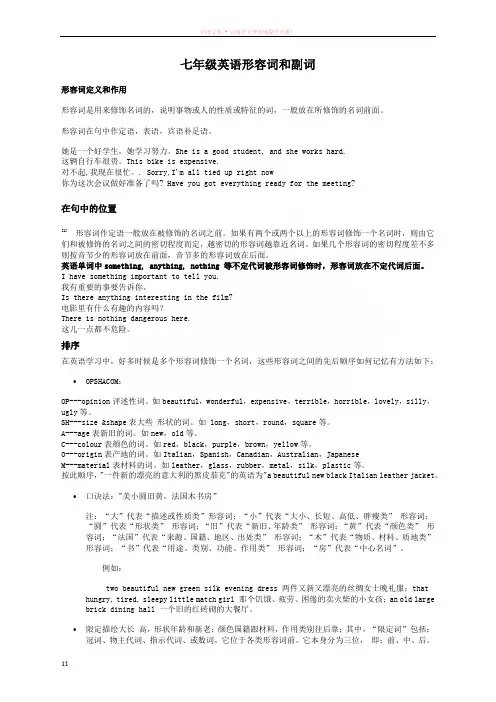
七年级英语形容词和副词形容词定义和作用形容词是用来修饰名词的,说明事物或人的性质或特征的词,一般放在所修饰的名词前面。
形容词在句中作定语,表语,宾语补足语。
她是一个好学生,她学习努力。
She is a good student, and she works hard.这辆自行车很贵。
This bike is expensive.对不起,我现在很忙。
. Sorry,I'm all tied up right now你为这次会议做好准备了吗? Have you got everything ready for the meeting?在句中的位置[1]形容词作定语一般放在被修饰的名词之前。
如果有两个或两个以上的形容词修饰一个名词时,则由它们和被修饰的名词之间的密切程度而定,越密切的形容词越靠近名词。
如果几个形容词的密切程度差不多则按音节少的形容词放在前面,音节多的形容词放在后面。
英语单词中something, anything, nothing 等不定代词被形容词修饰时,形容词放在不定代词后面。
I have something important to tell you.我有重要的事要告诉你。
Is there anything interesting in the film?电影里有什么有趣的内容吗?There is nothing dangerous here.这儿一点都不危险。
排序在英语学习中,好多时候是多个形容词修饰一个名词,这些形容词之间的先后顺序如何记忆有方法如下:•OPSHACOM:OP---opinion评述性词。
如beautiful,wonderful,expensive,terrible,horrible,lovely,silly,ugly等。
SH---size &shape表大些形状的词。
如 long,short,round,square等。
A---age表新旧的词。
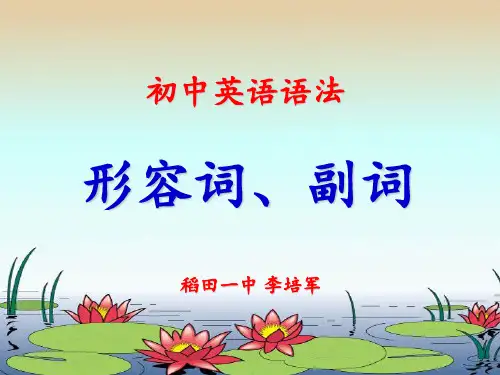
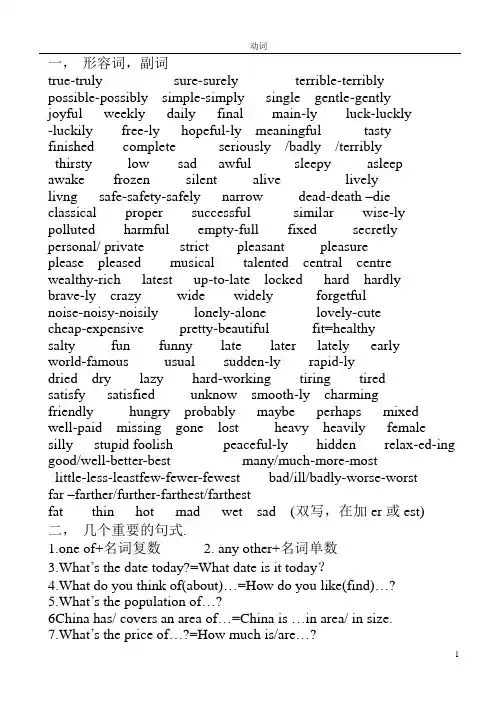
一,形容词,副词true-truly sure-surely terrible-terriblypossible-possibly simple-simply single gentle-gentlyjoyful weekly daily final main-ly luck-luckly-luckily free-ly hopeful-ly meaningful tastyfinished complete seriously /badly /terriblythirsty low sad awful sleepy asleepawake frozen silent alive livelylivng safe-safety-safely narrow dead-death –die classical proper successful similar wise-ly polluted harmful empty-full fixed secretly personal/ private strict pleasant pleasureplease pleased musical talented central centrewealthy-rich latest up-to-late locked hard hardlybrave-ly crazy wide widely forgetfulnoise-noisy-noisily lonely-alone lovely-cutecheap-expensive pretty-beautiful fit=healthysalty fun funny late later lately earlyworld-famous usual sudden-ly rapid-lydried dry lazy hard-working tiring tiredsatisfy satisfied unknow smooth-ly charmingfriendly hungry probably maybe perhaps mixedwell-paid missing gone lost heavy heavily female silly stupid foolish peaceful-ly hidden relax-ed-ing good/well-better-best many/much-more-mostlittle-less-leastfew-fewer-fewest bad/ill/badly-worse-worstfar –farther/further-farthest/farthestfat thin hot mad wet sad (双写,在加er或est) 二,几个重要的句式.1.one of+名词复数2. any other+名词单数3.What’s the date today?=What date is it today?4.What do you think of(about)…=How do you like(find)…?5.What’s the population of…?6China has/ covers an area of…=China is …in area/ in size.7.What’s the price of…?=How much is/are…?=How much do/does …cost?8.What’s the weather like today?=How is the weather?9.What day is it today?10.How are you?=How are you doing?11. can’t be too+adj.12.What’s the weight of..?=How much do/does …weigh?13.What do you think makes him so clever?14. so/such… that15.How much do you know about …?=How well do you know…?16.Which is the way to…? Can you tell me which is the way to the zoo?17.I wonder what is wrong with her.18. the key to the door the answers to the questions19.appear take place happen 不可用被动语态,主动语态表被动意义。
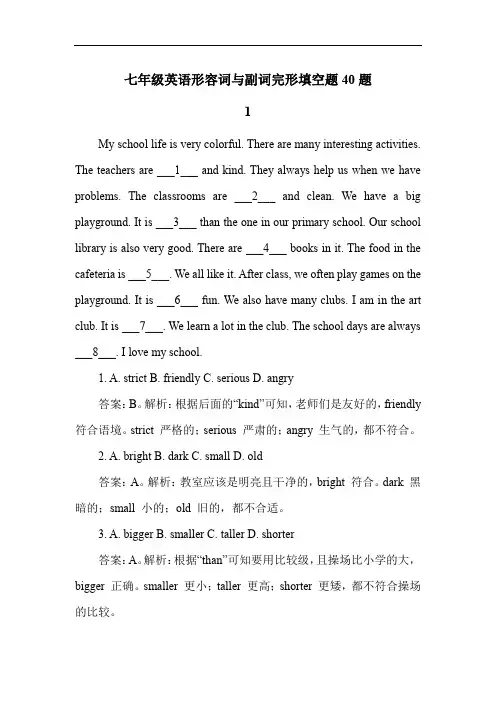
七年级英语形容词与副词完形填空题40题1My school life is very colorful. There are many interesting activities. The teachers are ___1___ and kind. They always help us when we have problems. The classrooms are ___2___ and clean. We have a big playground. It is ___3___ than the one in our primary school. Our school library is also very good. There are ___4___ books in it. The food in the cafeteria is ___5___. We all like it. After class, we often play games on the playground. It is ___6___ fun. We also have many clubs. I am in the art club. It is ___7___. We learn a lot in the club. The school days are always ___8___. I love my school.1. A. strict B. friendly C. serious D. angry答案:B。
解析:根据后面的“kind”可知,老师们是友好的,friendly 符合语境。
strict 严格的;serious 严肃的;angry 生气的,都不符合。
2. A. bright B. dark C. small D. old答案:A。
解析:教室应该是明亮且干净的,bright 符合。

初中英语形容词和副词(含解析)专题形容词和副词考点一形容词、副语的句法功能形容词和副词都是起修饰作用的词。
它们各自的功能以下:词类功能定语例句Han Mei is abeautifulgirl.韩梅是一个漂亮的女孩。
The meal is very表语这顿饭很美味。
delicious.形容词We must keep the classroomclean.宾语补足语我们一定保持教室洁净。
Bill gets up状语lateon weekends.比尔在周末起得晚。
Lifehereis rich and interesting.副词后置定语这里的生活既富饶又风趣。
Class is表语放学了。
考点二描述词的摆列序次许多学生对怎样摆列形容词的词序颇感疑惑。
over.在此,我们向同砚们引见一个简朴的影象办法。
请你记住“限观形龄色国材”,假设这几个字欠好记,你就记“县官行令谢国财”。
口诀申明代表限制词,包含冠词、指示代词、例词the,this,that,my,Tom's,two词等。
县(限)形容词性物主代词、名词全部格、数官(观)代表见地的描画性描述词。
fine,beautiful,interesting代表表示大小、长短、高低及形状的行(形)small,tall,high,round描述词。
令(龄)代表年纪、新旧的形容词。
谢(色)代表颜色的形容词。
国代表国籍、地域、出处的形容词(或young,old,newred,black,whiteEnglish,名词)。
American财(材)代表中心名词组成资料的形容词。
wooden,stone,plasticThere is a fine old stone bridge near the village.村庄邻近有一座漂亮的古代石桥。
I bought a cheap blue plastic pencil box yesterday.昨天我买了一个廉价的蓝色塑料铅笔盒。

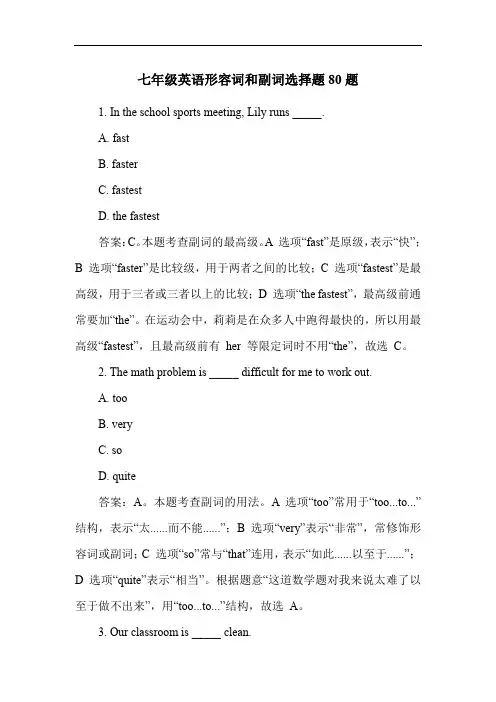
七年级英语形容词和副词选择题80题1. In the school sports meeting, Lily runs _____.A. fastB. fasterC. fastestD. the fastest答案:C。
本题考查副词的最高级。
A 选项“fast”是原级,表示“快”;B 选项“faster”是比较级,用于两者之间的比较;C 选项“fastest”是最高级,用于三者或三者以上的比较;D 选项“the fastest”,最高级前通常要加“the”。
在运动会中,莉莉是在众多人中跑得最快的,所以用最高级“fastest”,且最高级前有her 等限定词时不用“the”,故选C。
2. The math problem is _____ difficult for me to work out.A. tooB. veryC. soD. quite答案:A。
本题考查副词的用法。
A 选项“too”常用于“too...to...”结构,表示“太......而不能......”;B 选项“very”表示“非常”,常修饰形容词或副词;C 选项“so”常与“that”连用,表示“如此......以至于......”;D 选项“quite”表示“相当”。
根据题意“这道数学题对我来说太难了以至于做不出来”,用“too...to...”结构,故选A。
3. Our classroom is _____ clean.B. reallyC. muchD. many答案:B。
本题考查形容词和副词的区分。
A 选项“real”是形容词,“真的”;B 选项“really”是副词,“真正地,确实”,修饰形容词clean;C 选项“much”常修饰不可数名词或比较级;D 选项“many”常修饰可数名词复数。
这里需要一个副词修饰clean,故选B。
4. Tom is a _____ student. He studies very _____.A. good; goodB. good; wellC. well; goodD. well; well答案:B。
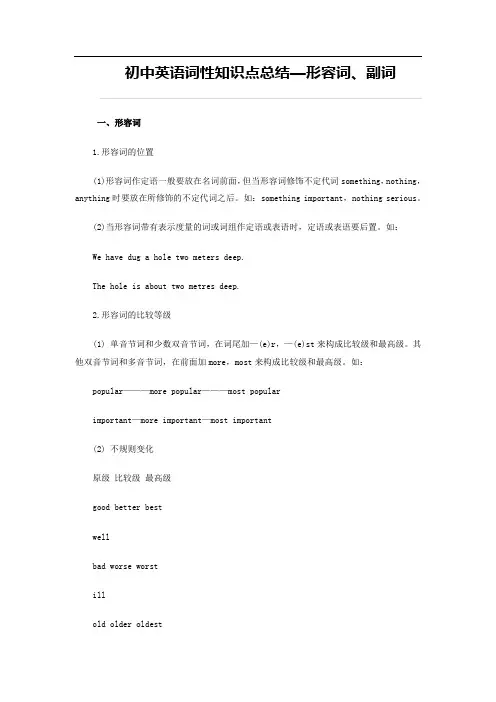
初中英语词性知识点总结—形容词、副词一、形容词1.形容词的位置(1)形容词作定语一般要放在名词前面,但当形容词修饰不定代词something,nothing,anything时要放在所修饰的不定代词之后。
如:something important,nothing serious。
(2)当形容词带有表示度量的词或词组作定语或表语时,定语或表语要后置。
如:We have dug a hole two meters deep.The hole is about two metres deep.2.形容词的比较等级(1) 单音节词和少数双音节词,在词尾加—(e)r,—(e)st来构成比较级和最高级。
其他双音节词和多音节词,在前面加more,most来构成比较级和最高级。
如:popular———more popular———most popularimportant—more important—most important(2) 不规则变化原级比较级最高级good better bestwellbad worse worstillold older oldestelder eldestmany more mostmuchlittle less leastfar farther farthestfurther furthest3. 形容词比较级的用法形容词比较级通常可分为原级、比较级、最高级三种基本形式,具体而言,它们分别以下列形式出现在句中:它们分别以下列形式出现在句中:(1)as+原级+as(2)比较级+than(3)the+最高级+of (in)...需注意的原级的用法:(1)否定结构有A..。
not as+形容词原级+as B及A...not so +形容词原级+as B两种结构。
(2)表示倍数有...times as+形容词原级+as的句型。
如:This garden is ten times as large as that one.This room is twice as large as that one.(3)half as+形容词原级+as表示“……的一半”。
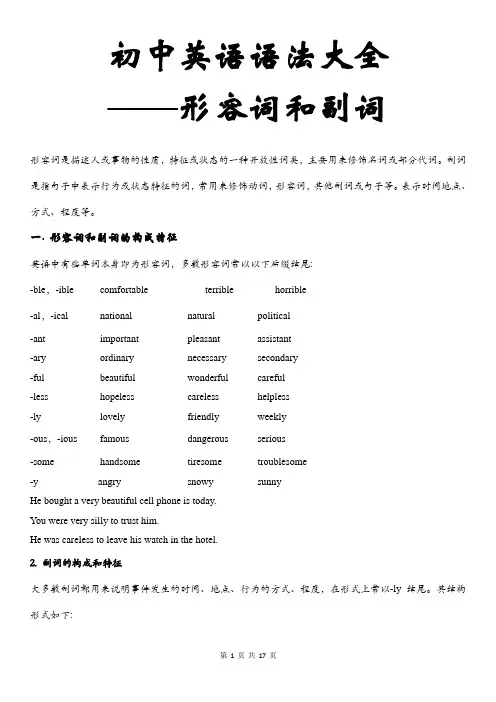
初中英语语法大全——形容词和副词形容词是描述人或事物的性质,特征或状态的一种开放性词类,主要用来修饰名词或部分代词。
副词是指句子中表示行为或状态特征的词,常用来修饰动词,形容词,其他副词或句子等。
表示时间地点、方式、程度等。
一. 形容词和副词的构成特征英语中有些单词本身即为形容词,多数形容词常以以下后缀结尾:-ble,-ible comfortable terrible horrible-al,-ical national natural political-ant important pleasant assistant-ary ordinary necessary secondary-ful beautiful wonderful careful-less hopeless careless helpless-ly lovely friendly weekly-ous,-ious famous dangerous serious-some handsome tiresome troublesome-y angry snowy sunnyHe bought a very beautiful cell phone is today.You were very silly to trust him.He was careless to leave his watch in the hotel.2. 副词的构成和特征大多数副词都用来说明事件发生的时间、地点、行为的方式、程度,在形式上常以-ly结尾。
其结构形式如下:The detective carefully observed everything in the room.He will completely finish his work by the end of this month.Such things will easily happen.二. 形容词和副词的种类1. 形容词的种类(1) 根据其结构形式分类,形容词可以分为简单形容词和合成形容词两类。
讲义3 :形容词一、形容词的定义:表示人或事物的属性,特征或状态的词叫形容词(Adjective).形容词修饰名词,它的基本用法就是为名词提供更多的信息,它分为性质形容词和叙述形容词两类.二、形容词的位置1、单个形容词修饰名词时,一般要放在名词的前面,做定语。
它们的前面常常带有冠词、形容词性物主代词、指示代词、数词等。
例如:a red flower一朵红花 this interesting story这个有趣的故事six blind men 六个盲人 my own house我自己的房子形容词修饰something, anything, nothing, everything等不定代词时,形容词放在名词后面。
例如:I have something important to tell you.Is there anything interesting in the film.三、形容词和副词的等级变化大多数形容词和副词有三个级:原级(即原形)、比较级和最高级。
1 一般在词末尾加er变比较级,加est变最高级。
strong —stronger -strongest small--smaller--smallest hard→harder →hardest fast→faster →fastest2 如果以e结尾,只加r 或st。
nice--nicer--nicest fine--finer--finest3 以重读闭音节,末尾只有一个辅音字母,须先双写这个辅音字母,再加er或est。
sad--sadder-- saddest big--bigger--biggest hot--hotter --hottest4 以辅音字母加y结尾的词,把y变成i,再加er或est。
angry--angrier-angriest early→earlier →earliest hungry-hungrier-hungriest5、但是,开放类副词即形容词加ly结尾变成的副词加more或most.如quickly →more quickly →most quickly quietly →more quietly →most quietlyslowly—more slowly—most slowly[注]:early中的ly不是后缀,故把y变i再加er和est6、大部分双音节和所有多音节词都在其前面加more变比较级,加most变最高级different -more different -most differentbeautiful--more beautiful--the most beautifulexpensive--more expensive--the most expensive但是,以形容前缀un结尾的三音节形容词不适合上述情况,如unhappy,untidy,我们可以说:unhappier→u nhappiest,形容词比较级和最高级的不规则变化四.形容词副词的用法1."the+形容词",表示一类人或事物,相当于名词,用作主语及宾语The old often think of old things.2 "The+形容词比较级..., the+形容词比较级..."表示 " 越... 就越..."。
初中英语知识点归纳形容词和副词的用法区别总结形容词和副词是英语语法中的两个重要部分。
它们在句子中具有不同的作用和用法。
下面是对初中英语知识点中形容词和副词用法区别的总结。
一、形容词的用法1. 形容词可以修饰名词,并在句中作定语,用于描述名词的性质、特征或状态。
例句:a beautiful girl(一个美丽的女孩)2. 形容词可以充当表语,与系动词be连用,用于描述主语的性质或状态。
例句:She is intelligent.(她很聪明。
)3. 形容词可以在句中作宾语补足语,用于补充说明及描述宾语。
例句:I found the movie interesting.(我觉得这部电影有趣。
)4. 形容词可以用来表示数量或顺序的范围。
例句:He has only three books.(他只有三本书。
)二、副词的用法1. 副词可以修饰动词,用于描述动作的方式、频率、程度等。
例句:She runs quickly.(她跑得很快。
)2. 副词可以修饰形容词,用于描述形容词所修饰的程度。
例句:He is very tall.(他非常高。
)3. 副词可以修饰其他副词,用于描述副词之间的程度关系。
例句:He speaks English quite fluently.(他英语说得相当流利。
)4. 副词可以在句中作状语,表示时间、地点、原因、方式、条件等。
例句:We will go to the park tomorrow.(我们明天去公园。
)三、形容词和副词的区别1. 作用对象不同- 形容词主要用于修饰名词,描述名词的性质、特征或状态。
- 副词主要用于修饰动词、形容词、其他副词,表示动作的方式、程度、频率等。
2. 词性不同- 形容词是描述性词,属于形容词类。
- 副词是修饰性词,属于副词类。
3. 位置不同- 形容词通常位于名词之前,修饰名词。
- 副词可以位于动词、形容词、副词等之前或之后,修饰这些词。
4. 用法不同- 形容词在句中可以作定语、表语、宾语补足语等。
初中英语知识点归纳形容词和副词归纳英语中的形容词(Adjective)和副词(Adverb)是我们学习英语语法必须要掌握的重要知识点。
形容词用来修饰名词,描述事物的性质和特征;而副词则用来修饰动词、形容词、副词等,表示程度、方式、时间等。
一、形容词的基本用法1. 形容词的位置:形容词通常位于名词前面。
例句:- A beautiful flower.- The tall boy.2. 形容词的比较级和最高级:形容词的比较级表示两个人或物之间的比较,最高级表示三个或三个以上人或物之间的比较。
例句:- This book is more interesting than that one.- Lily is the tallest girl in our class.3. 形容词的修饰范围:形容词可以修饰单数或复数的名词。
例句:- The red apple is sweet.- The red apples are sweet.4. 形容词的性、数和格的变化:形容词的形式根据名词的性、数和格的变化而变化。
例句:- He is a happy boy.- She is a happy girl.二、常见形容词分类1. 大小、长短、高低等形容词:- big(大)- small(小)- long(长)- short(短)- tall(高)- low(低)2. 颜色形容词:- red(红色)- blue(蓝色)- green(绿色)- yellow(黄色)3. 品质形容词:- good(好的)- bad(坏的)- happy(快乐的)- sad(伤心的)三、副词的基本用法1. 副词的位置:副词通常位于动词或形容词之后。
例句:- He runs quickly.- She speaks English fluently.2. 副词修饰动词的方式:副词可以修饰动词,表示动作的方式。
例句:- She sings beautifully.- He speaks loudly.3. 副词修饰形容词或副词的程度:副词可以修饰形容词或副词,表示程度或程度的变化。
初中七年级英语语法基础知识大全摘要:1.介词2.代词3.动词4.名词5.形容词6.副词7.句子结构8.语序9.语态10.时态正文:作为一名初中七年级的英语学生,掌握英语语法基础知识是非常重要的。
以下是一些英语语法基础知识的汇总,包括介词、代词、动词、名词、形容词、副词、句子结构、语序和时态。
1.介词:介词是用于表示时间、地点、方向、目的等概念的词。
常见的介词有:at、in、on、to、from、by、of、up、off、out、as、with 等。
2.代词:代词是用于替换名词的词。
常见的代词有:I、you、he、she、it、we、they、me、him、her、us、them、my、your、his、her、its、our、their 等。
3.动词:动词是用于表示动作或状态的词。
动词分为及物动词和不及物动词。
及物动词需要跟宾语,不及物动词不需要跟宾语。
常见的动词有:run、jump、swim、eat、sleep、study、play 等。
4.名词:名词是用于表示人、物、地方或抽象概念的词。
名词分为可数名词和不可数名词。
可数名词可以分成单数和复数,不可数名词没有单复数之分。
常见的名词有:student、teacher、dog、cat、book、pen、water、air 等。
5.形容词:形容词是用于修饰名词的词。
形容词分为原级、比较级和最高级。
原级形容词表示一般状态,比较级形容词表示比较状态,最高级形容词表示最高状态。
常见的形容词有:big、small、tall、short、long、short、nice、good 等。
6.副词:副词是用于修饰动词、形容词、其他副词或整个句子的词。
副词分为原级、比较级和最高级。
原级副词表示一般状态,比较级副词表示比较状态,最高级副词表示最高状态。
常见的副词有:always、never、sometimes、often、very、quite、too 等。
7.句子结构:句子结构是指句子中各成分的排列顺序。
七年级英语语形容词及副词专项复习形容词是用来表示人或事物的属性或特征的词,一般置于所修饰的名词之前。
表示行为特征或性状特征的词叫副词,它用来修饰动词,形容词以及其他副词或整个句子。
形容词和副词在语法结构中可用于比较级和最高级。
一、形容词的用法1. 形容词可以修饰名词和代词,在句中作定语、表语、宾语补足语等。
例如:He is a good actor. 他是一名好演员。
(定语)This bag is light, but that one is heavy. 这只包很轻,但那只很重。
(表语)We think it important to learn English well. 我们认为学好英语很重要。
(宾语补足语)2. 名词化的形容词某些形容词前加定冠词the, 变成名词化的形容词。
即the 形容词表示一类人或事物,作主语时要求谓语用复数动词。
例如:The old today are taken good care of.如今,老人受到了良好的照顾。
The rich don’t enjoy themselves. 那些富人并不快乐。
3. 形容词的排序a. 一般情况下,形容词放在被修饰的名词之前。
但是,当形容词修饰由some, any, every, no等构成的复合不定代词时,要后置。
例如: I have something important to tell you.我有重要的事情告诉你。
b. 当有几个形容词修饰名词时,这些形容词的位置由它们和被修饰名词的关系和密切程度来决定。
一般来说,关系最密切的最靠近被修饰的名词,关系较远的离被修饰的名词也较远。
例如:A beautiful little yellow flower is on the table.一朵美丽的小黄花在桌上。
二.副词的用法副词是用来修饰动词、形容词以及其他副词的词,表示时间、地点、程度、方式等概念。
在句中常常作状语,也可作定语和表语。
4. 形容词和副词形容词及其用法形容词修饰名词,说明事物或人的性质或特征。
通常,可将形容词分成性质形容词和叙述形容词两类,其位置不一定都放在名词前面。
1)直接说明事物的性质或特征的形容词是性质形容词,它有级的变化,可以用程度副词修饰,在句中可作定语、表语和补语。
例如:hot。
2)叙述形容词只能作表语,所以又称为表语形容词。
这类形容词没有级的变化,也不可用程度副词修饰。
大多数以a开头的形容词都属于这一类。
例如:afraid 害怕的。
(错)He is an ill man.(对)The man is ill.(错)She is an afraid girl.(对)The girl is afraid.这类词还有: well,unwell,ill,faint,afraid,alike,alive,alone,asleep,awake 等。
3)形容词作定语修饰名词时,要放在名词的前边。
但是如果形容词修饰以-thing为字尾的词语时,要放在这些词之后。
例如:something nice.以-ly结尾的形容词1)大部分形容词加-ly可构成副词。
但 friendly,deadly,lovely,lonely,likely,lively,ugly,brotherly,仍为形容词。
改错:(错) She sang lovely.(错) He spoke to me very friendly.(对) Her singing was lovely.(对) He spoke to me in a very friendly way.2)有些以-ly 结尾既为形容词,也为副词,如daily,weekly,monthly,yearly,early 等。
例如:The Times is a weekly paper. 《时代周刊》为周刊。
The Times is published weekly. 《时代周刊》每周发行一期。
用形容词表示类别和整体1)某些形容词加上定冠词可以泛指一类人,与谓语动词的复数连接,如the dead,the living,the rich,the poor,the blind,the hungry等。
例如:The poor are losing hope. 穷人行将失去希望。
2)有关国家和民族的形容词加上定冠词指这个民族的整体,与动词的复数连用,如the British,the English,the French,the Chinese等。
例如:The English have wonderful sense of humor. 英国人颇有幽默感。
多个形容词修饰名词的顺序多个形容词修饰名词时,其顺序为:限定词--数词--描绘词--(大小,长短,形状,新旧,颜色)--出处--材料性质--类别--名词。
例如:a small round table/ a tall gray building/ a dirty old brown shirt/ a famous German medical school/ an expensive Japanese sports car典型例题:1) Tony is going camping with ___ boys.A. little two otherB. two little otherC. two other littleD. little other two答案:C。
由"限定词--数词--描绘词--(大小,长短,形状,新旧,颜色) --性质--名词"的顺序可知数词,描绘词,性质依次顺序,只有C符合答案。
2) One day they crossed the ____bridge behind the palace.A. old Chinese stoneB. Chinese old stoneC. old stone ChineseD. Chinese stone old答案A. 几个形容词修饰一个名词,他们的排列顺序是:年龄,形状,大小+颜色+来源+质地+用途+国家+名词。
3) ---- How was your recent visit to Qingdao---- It was great. We visited some friends,and spent the ___days at the seaside.A. few last sunnyB. last few sunnyC. last sunny fewD. few sunny last答案:B。
本题考查多个形容词的排序问题。
一般与被修饰形容词关系密切的形容词靠近名词;如果几个形容词的重要性差不多,音节少的形容词在前,音节多的方在后,在不能确定时,可参照:限定词+数量词(序数词在前,基数词在后)+性状形容词+大小、长短、高低等形体+新旧+颜色+国籍+材料+名词,如those + three + beautiful + large + square +old + brown + wood + table。
副词及其基本用法副词主要用来修饰动词,形容词,副词或其他结构。
一、副词的位置1)在动词之前。
2)在be动词、助动词之后。
3)多个助动词时,副词一般放在第一个助动词后。
注意:a. 大多数方式副词位于句尾,但宾语过长,副词可以提前,以使句子平衡。
例如:We could see very clearly a strange light ahead of us.我们清楚地看到前面有奇怪的光。
b. 方式副词well,badly,hard等只放在句尾。
例如:He speaks English well. 他英语说得好。
二、副词的排列顺序:1)时间,地点副词,小单位的在前,大单位在后。
2)方式副词,短的在前,长的在后,并用and或but等连词连接。
例如: Please write slowly and carefully. 请写得慢一些,仔细一些3)多个不同副词排列:程度+地点+方式+时间副词。
注意:副词very 可以修饰形容词,但不能修饰动词。
改错:(错)I very like English.(对)I like English very much.注意:副词enough要放在形容词的后面,形容词enough放在名词前后都可。
例如:I don't know him well enough. 他我不熟悉。
There is enough food for everyone to eat.有足够的食物供每个人吃。
There is food enough for everyone to eat.兼有两种形式的副词1) close与closelyclose意思是"近";closely 意思是"仔细地"。
例如:He is sitting close to me. 他就坐在我边上。
Watch him closely. 盯着他。
2) late 与latelylate意思是"晚";lately 意思是"最近"。
例如:You have come too late. 你来得太晚了。
What have you been doing lately 近来好吗3) deep与deeplydeep意思是"深",表示空间深度;deeply时常表示感情上的深度,"深深地"。
例如: He pushed the stick deep into the mud.他把棍子深深插进泥里。
Even father was deeply moved by the film.老爸也被电影深深打动了。
4) high与highlyhigh表示空间高度;highly表示程度,相当于much。
例如:The plane was flying high. 这架飞机飞得很高。
I think highly of your opinion. 你的看法很有道理。
5) wide与widelywide表示空间宽度;widely意思是"广泛地","在许多地方"。
例如:He opened the door wide. 他把门开得大大的。
English is widely used in the world.英语在世界范围内广泛使用。
6) free与freelyfree的意思是"免费";freely 的意思是"无限制地"。
例如:You can eat free in my restaurant whenever you like.无论什么时候,我这饭铺免费对你开放。
You may speak freely; say what you like.你可以畅所欲言,想说什么就说什么。
形容词与副词的比较级大多数形容词(性质形容词)和副词有比较级和最高级的变化,即原级、比较级和最高级,用来表示事物的等级差别。
原级即形容词的原形,比较级和最高级有规则变化和不规则变化两种。
1)规则变化单音节词和少数双音节词,加词尾-er,-est来构成比较级和最高级。
构成法原级比较级最高级一般单音节词未尾加-er,-esttalltallertallest以不发音的e结尾的单音词和少数以- le结尾的双音节词只加-r,-stnicenicernicest以一个辅音字母结尾的闭音节单音节词,双写结尾的辅音字母,再加-er,-est bigbiggerbiggest"以辅音字母+y"结尾的双音节词,改y为i,再加-er,-estbusybusierbusiest少数以-er,-ow结尾的双音节词未尾加-er,-estclever/narrowcleverer/ narrowercleverest/ narrowest其他双音节词和多音节词,在前面加more,most来构成比较级和最高级important/ easilymore important/ more easilymost important/ most easily2)不规则变化原级比较级最高级goodbetterbestwell(健康的)worseworstbadill(有病的)oldolder/elder oldest/eldestmuch/manymoremostlittlelessleastfarfarther/furtherfarthest/furthest. as + 形容词或副词原级 + as1)在否定句或疑问句中可用so… as。
例如:He cannot run so/as fast as you. 他没你跑得快。